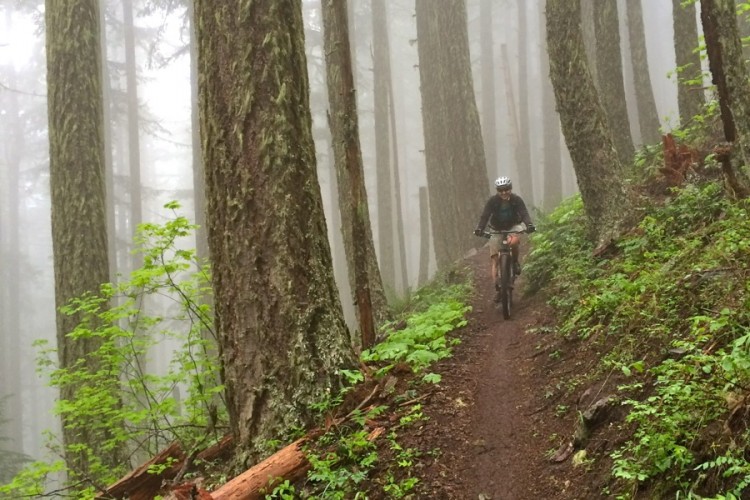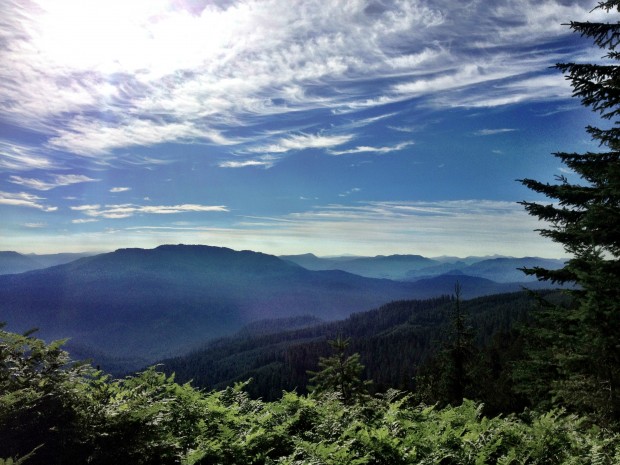
The little town of Oakridge, Oregon, is preparing for mountain biking season. The small community swells each summer as mountain bikers come from near and far to ride the technical terrain and seemingly endless singletrack.
The end of June is hectic, as Mountain Bike Oregon, one of the state’s largest mountain bike festivals, vastly multiplies what will already be a busy weekend. Oakridge gears up to host bike industry folks and recreational riders alike for three days of music, food, and, of course, riding.
However, many Oakridge residents feel the mountain bike culture that, in some ways, saved the town is again threatened. For many in Oakridge, a proposed rock quarry is too close to the trails and too close to the town.
What trails would be affected?
The proposed quarry, if approved, will be situated on the eastern side of town on what is known as TV Butte. This area is home to several iconic trails, including Heckletooth, Aubrey, Salmon Creek, and Dead Mountain. A new trail is currently under construction and will also be impacted if the proposed quarry is passed.
Michelle Emmons, Executive Director of the Oakridge Trail Alliance, told Singletracks that while these trails aren’t slated to be closed, they will undoubtedly be affected.
“Those trails will be impacted by sound and dust,” Emmons told us. “Traffic as well. There’s going to be 80 to 100 trucks that will be traveling down [the] road. So all that dust will be traveling on those same corridors where people are riding bicycles; it’s an issue of clean air.”
The dust Emmons is referring to is silica dust. Silica is a naturally occurring material found in many rocks, sand, and clay, making silica dust an obvious byproduct of construction operations like rock quarries. This dust can be so fine that it will not only easily travel airborne but can also be breathed into the lungs. Exposure and inhalation of silica dust can cause a chronic lung disease known as silicosis. And while silicosis develops over time, the symptoms include a lingering cough, fatigue, shortness of breath, and weakness. These symptoms will worsen the longer an individual is exposed to silica dust.
Emmons addressed this air quality issue with the Lane County Planning Commission, the governing body that ultimately decides to approve or deny the proposed quarry. In a letter from the Oakridge Trail Alliance Board of Directors, Emmons wrote:
Furthermore, the proposed quarry’s operations would introduce significant air quality hazards, particularly concerning silica dust. This poses a health risk to residents and visitors alike, contradicting Lane County’s substantial investments in improving Oakridge’s air quality. Given the existing challenges of wildfire smoke shortening the prime tourism season and impacting the safety of outdoor activities, why would Lane County allow such an obvious environmental challenge to exacerbate the situation, further deterring visitors and harming our local tourism economy?
It isn’t just the dust for Emmons, as she is also concerned about the impact that adding up to 100 trucks a day will have on roads that feed the trailheads. Many of these trailheads have been improved to accommodate all recreational users, skills, and abilities. If the quarry proposal passes, these users could fight heavy traffic from large construction trucks.
Oakridge is a small town, and besides the recreation traffic, its roads are relatively quiet. Adding truck after truck in the area raises concern for those who choose to access the trails by bike rather than driving and parking at the trailhead.
Bigger than biking
According to Emmons, impacts from the proposed rock quarry go beyond mountain bikes. Regardless of whether they’ve ever ridden down one of the many great trails in the area, Emmons says this is a proposal the residents of Oakridge don’t want to see passed.
“There’s been no one that has stepped up to the plate at the public venue to say that they supported this [quarry] operation,” Emmons said.
Singletracks spoke with Emmons the day after Oakridge had a town hall meeting to discuss the quarry proposal. Of the roughly 20 or so people who spoke, all were opposed to the quarry. Even more voiced their opposition a few years ago, the last time this quarry proposal was struck down by Lane County.
Yes, you read that right: this isn’t the first time this has happened.
The current quarry proposal is actually the third iteration of the same plan. The quarry site, owned by Old Hazeldell LLC, is “invested in part by Ed King of King Estate Winery,” according to NBC 16.
Emmons stated that shortcomings in the last proposal didn’t help the quarry, yet the new proposal doesn’t seem to address those issues. Issues such as water — according to Emmons, the quarry needs 5,000 gallons a day.
“They don’t know where they’re getting water from,” Emmons explained, telling us that several attempts have been made drilling for water on the proposed property, all coming up dry. “If they drill into the aquifer that supports all the neighborhood residents in the area and use that water, who knows what will happen to the wells.”
TV Butte sits in an old industrial area of Oakridge. This would be a perfect location if Oakridge wanted to continue industrial work there. However, new homes and businesses are being planned for this industrial park area.
Visitors come to Oakridge to be outside. Lush forested mountains surround this town sitting in a river valley, similar to what you might see on a postcard. Wineries and restaurants slated to open up shop in the new industrial park may be hesitant if their neighbor is a rock quarry.
“Having a rock quarry sitting on the edge of town producing dust, bringing traffic down the roads adjacent to the industrial park, which is being developed as a business hub, and also a recreational hub that connects people to the east side of Oakridge and the trails — it’s not a compatible use. It doesn’t fit the plan,” Emmons said.
Singletracks will continue to follow this story and update you when Lane County reaches a decision. For more information, visit oakridgestrong.org.





















3 Comments
Jun 26, 2024
contaminate wells and even the Willamette River. And more.
(The article contains one inaccura y - it is the Board of Commissioners, not the Planning Commission, who makes the final decision.)
Jun 26, 2024
Jun 25, 2024